UFC champion Robert Whittaker reveals his 12-year battle with depression
For the first time, Australia’s most dangerous man and first UFC champion Robert Whittaker has opened up on the depression battle he fought for over a decade.
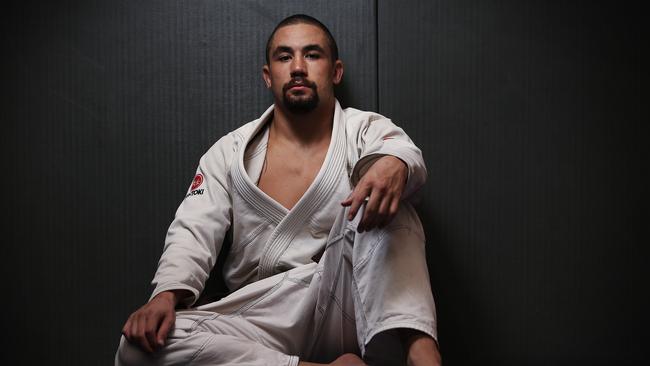
UFC
Don't miss out on the headlines from UFC. Followed categories will be added to My News.
WORLD’S BEST: One more accolade for Whittaker
WARNING: Kostya’s warning for Tim
Robert Whittaker remembers hiding away for days, even weeks inside his own home.
First time, he was 16.
A young housing commission kid so down life, on the world, he just stopped going out into it.
Instead, drawing the curtains and doing little but sleep. For days.
Not answering the door when mates knocked.
Not answering his phone when mates called.
“Just tucked myself away,” says Australia’s most dangerous man, “and hid”.
Which made no sense, to anyone.
Understanding even at 16, Whittaker already boasted both the capability, and cajones, required for first grade footy with Menai Roosters.
Live stream UFC with ESPN on KAYO. Live Fight Nights plus pre-fight shows and prelims of Pay-Per-View events. Get your 14-day free trial and start streaming instantly >
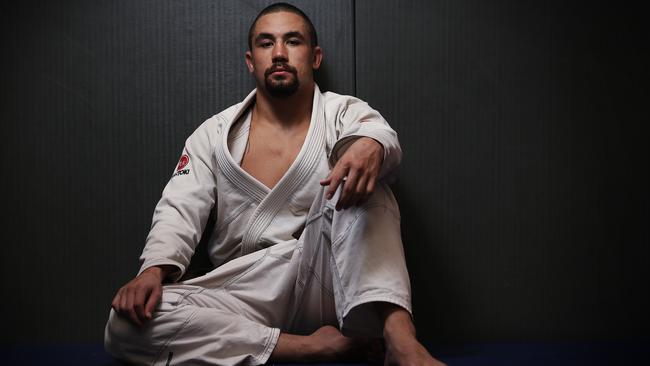
Down at his local gym too, promise dripping from those fists that have since earned upwards of $2.5 million.
Still, when he looked in the mirror, it wasn’t what the schoolboy saw.
No, what Whittaker saw was what he didn’t have.
Like cash. Or a house with both parents.
Which stands you out in a suburb like Menai, where no railway station meant housos like him were few.
“So the differences between me and everyone else,” Whittaker recalls, “they were glaring”.
Still, the kid had his looks.
Maybe, some said, an NRL career.
And throw down? Yeah, Bobby Knuckles could do that.
By age 18, already on the type of pro career that opens with seven first round finishes.
Yet even with so many reasons to go out, Whittaker so often stayed in.
“And that became me,” he says. “Or who I thought was me. I was just a kid who couldn’t leave his house.”
But today?

“Today,” the UFC champion adds, a smile slowly creeping across his face, “yeah, I’m making significant change”.
Seated now in the lounge room of his sprawling Glenmore home -- dressed down in black shorts, black tee and black UFC slides -- Whittaker is for the first time opening up about his 12 years battling depression.
At 28, he knows the conversation shouldn’t feel this tough. Or new.
“But look at my job,” says the man who hasn’t dropped a bout in almost six years. “There’s a fighter within me, a warrior, who struggles to concede he isn’t invincible.”
Still, Whittaker is now having a crack anyway.
That one, untold story driving the biggest fight in Australian history.
Indeed, this is what Whittaker is headed for on October 6, at UFC 243.
Not only leaving the house, or defending his crown against undefeated New Zealand prodigy Israel Adesanya, but headlining Melbourne’s Marvel Stadium before an expected crowd of 50,000.
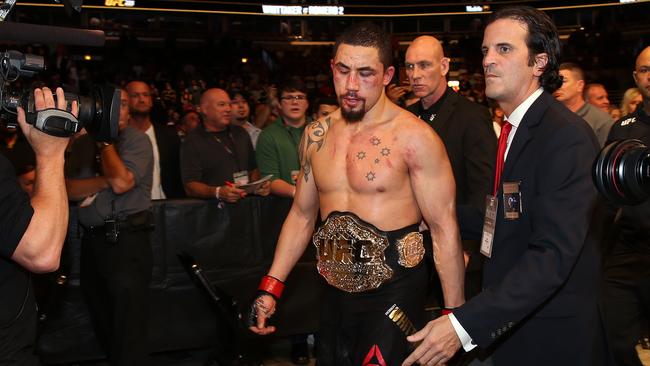
An arena so big, fighters start their journey to the Octagon in a golf cart.
Which isn’t to suddenly suggest Whittaker is cured.
No, when the black dog bites, that bastard stays gripped.
“But at least now,” the father-of-three says simply, “I understand its patterns, and how they affect me”.
Like in December last year, when training for a hometown title defence against American Kelvin Gastelum, and the champ suddenly found himself so overwhelmed by depression, by indifference, he wanted nothing but to brush workouts and take long naps.
Or months earlier in June, prior to defending against Cuban Yoel Romero, when mental illness again had this Musashi poster boy not wanting to train, answer texts, anything. Once again that young teen desiring only to hide.
Or as Whittaker remembers it: “Feeling terrible, then getting worse”.
So how the bloody hell is he here?
Not only on a unbeaten run boasting nine straight wins, gold strap and come NRL grand final day, that biggest live gate in UFC history, but everything else now making up this man all six pack, left hook and Southern Cross tattoo.
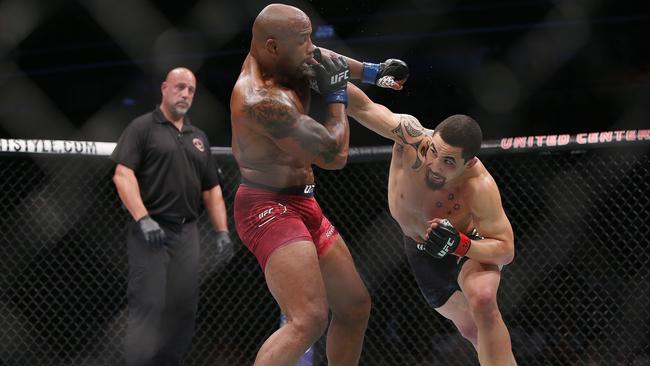
More the being the world’s greatest UFC middleweight, more than raising three children, adopting two younger siblings, even taking the inlaws into what he and wife Sofia lovingly call ‘The Village’, Whittaker is also now operating a Grange TV podcast, two Gracie Jiu Jitsu gyms, even a unique, educational course for men in remote indigenous communities.
Dubbed GAP, or the Gracie Aboriginal Program, the syllabus is helping hundreds of indigenous Australians achieve a TAFE education by mixing jiu jitsu classes with bookwork.
Next year, Whittaker starts studying to become a GAP teacher. Next month, opening his second Gracie gym in Artarmon.
While in between, also running kids’ jiu jitsu classes, undertaking a November speaking tour, even sorting the blueprint for a GAP educational facility.
“Because we’re already flying all these young men in from remote communities,” the fighter says. “So why not put them into our own classrooms too?”.
Yep, more than living with depression, Whittaker is now living in every sense.
And the secret?
“Communication,” he says.
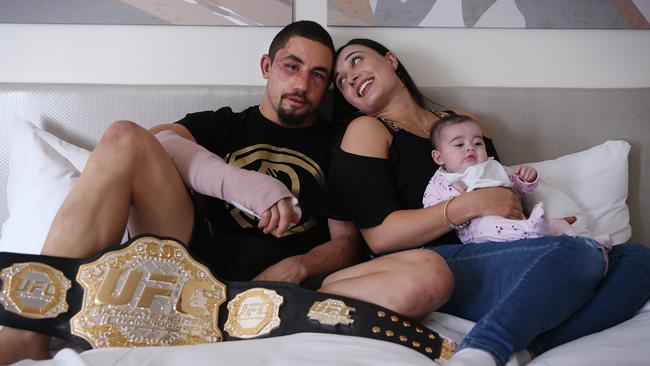
Specifically, with head coach Fabricio Itte. And wife Sophia; that childhood sweetheart Whittaker won over years ago at a paintball party -- when he stood close and continually wore all bullets meant for her.
“Growing up, I was really insecure,” continues the former Cityrail electrician. “I remember the first time Sophia’s parents offered to drive me home, I was too embarrassed to show them where I lived.
“So I had them drop me at some random house down the street.
“But as they drove off, Sophia looked back and saw me dashing away from the place I’d said was mine.
“I was such an idiot. Didn’t even wait.
“But I was dealing with some insecurities.”
Dealing with worse, too.
“I was always physical as a kid, always training,” continues the Auckland native who was two months old when dad, aka Big Jack, moved he and brother Steven to Australia.
“But when the depression hit, I wouldn’t have motivation for anything.
“So I’d skip sessions. Stay inside for weeks.
“I had no idea what was going on.”
So as for how he got out?
“I’d dig,” Whittaker continues. “Eventually get up and drag myself to training.
“And once those positive endorphins started flowing, it helped me dig further.
“But it’s only recently I’ve started understanding not only these patterns, but what causes them.”
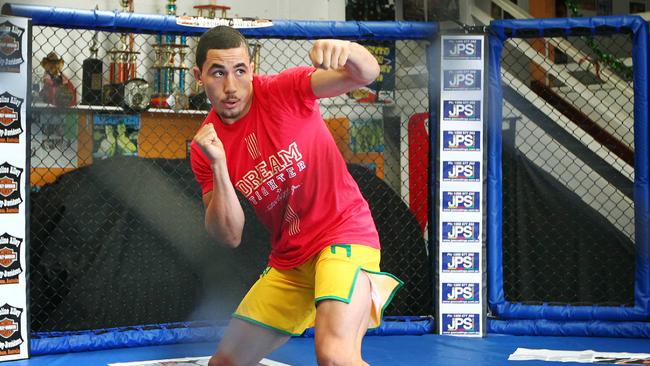
Yet even with new understanding, talking depression isn’t easy.
“As a person, I’m largely closed off,” says the superstar living so far onto the edges of what constitutes Sydney, his home is surrounded by cow paddocks, dams and yellow ‘Stock Crossing’ signs.
“I keep a high guard. Don’t let many people in.
“And that stems from my upbringing. How I’ve lived my life.
“But I also understand it’s time to change.”
Which is why, increasingly, Whittaker’s Grange TV podcast is such a powerful listen.
“Through the podcast, I’ll be sharing even the more vulnerable parts of my story,” he promises. “Which isn’t only therapeutic for me, but hopefully beneficial to others.
“I know as a kid, I would’ve liked to hear it.”
Elsewhere, his GAP program is also proving a strong avenue for change.
“But that’s my responsibility,” Whittaker continues. “Any athlete who finds themselves with a platform, it has to be used for more than trash talking on Twitter.
“If your talents aren’t being used for the betterment of others, it’s a waste.”
Importantly, Whittaker receives strong support from within ‘The Village’ too.
The fighter close with his father, fight team, extremely hands on with his own young children -- Jack, John and Lilliana -- while also helping raise, with the support of Sofia, younger siblings Henry and Ketty.
“And I owe Sofia so much,” he says. “She’s so positive, so upbeat.
“Knows how to get me up and about too.
“When I’m mopey and don’t want to leave home, she’s the one gets me out that door.”
Which is just as well given how often Whittaker is now opening it.
“Although I realise mental illness, it doesn’t play favourites,” he says.
“Doesn’t care if you’re earning $1 million a year. Doesn’t care if you’re the UFC champion.
“It’s still going to hit you the same.
“And I’m learning to understand that. Learning not only to identify the signs of depression, but what I can do to change them.
“But mostly ... yeah, I’m just learning to be kind to myself.”
Originally published as UFC champion Robert Whittaker reveals his 12-year battle with depression


